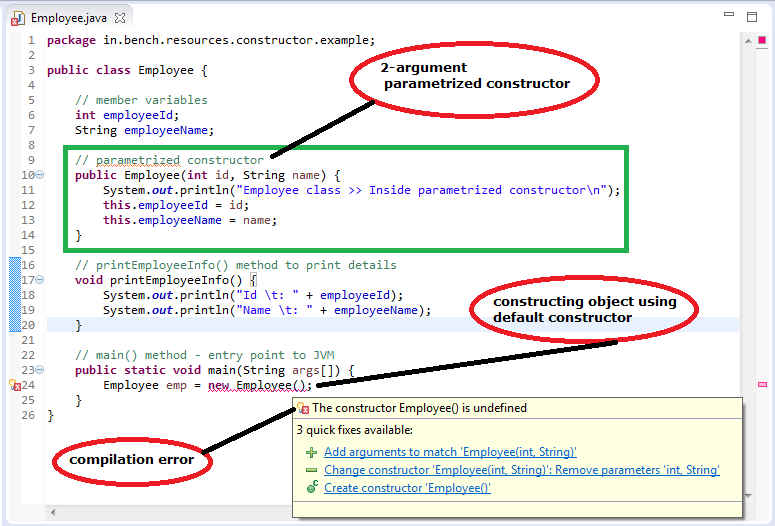
We can not declare a constructor as final, abstract, abstract and synchronized.Ī constructor has the same name as the class and we can write a constructor as follows: public class M圜lass.We can use the access modifiers with a constructor to control its access so that other classes can call the constructor.It can not have not even void as its return type. A constructor must have no return type.The name of the constructor must be the same as the name of its class.Rules for Writing Constructors in Javaįollowing are some rules for writing constructors in Java: We can create a constructor either explicitly through programming and if we do not define it explicitly, the Java compiler itself defines the default constructor. The constructors allow us to define the values while creating the objects. Can we define an Apple with no value defined for its properties? We can definitely not do this. But, when we create an object of the class Apple, now Apple will reside in the computer’s memory. If we create a class named Apple, then it will have some class variables like shape, color, and taste. To understand the importance of constructors, let’s take an example. We can use the constructors when we want to assign values to the class variables at the time of object creation. If we do not write any constructor in the class then the default constructor is called. Note: When we create an object of a class, at least one constructor is called. It is not necessary for Java coders to write a constructor for a class. The name of the constructor is the same name as that of the class and its primary job is to initialize the object with a legal initial value for the class. It is a special type of method that instantiates a newly created object and just after the memory allocation of this object takes place, the constructor is called. That's why if there are no constructors, java compiler will add a default constructor and calls super class constructor.“A Constructor is a member function which has the same name as its class and is used to initialize the object of that class type with the legal initial value.”Ī constructor is a member function of a class that is called for initializing objects when we create an object of that class. But when you are inheriting some class it is your class responsibility to call super class constructor to make sure that super class initializes all its instance variables properly.

Note: In side default constructor, it will add super() call also, to call super class constructor.Ĭonstructor's duty is to initialize instance variables, if there are no instance variables you could choose to remove constructor from your class. If there are no constructors added by you, then compiler generated default constructor will look like this. In your case, there is no default constructor as you are adding them programmatically. If a class doesn't have any constructor provided by programmer, then java compiler will add a default constructor with out parameters which will call super class constructor internally with super() call.
.jpg)
However, I am leaving it the answer because Technically it is not the constructor (default or otherwise) that default-initialises the fields. If a class contains no constructor declarations, then a default constructor with no formal parameters and no throws clause is implicitly declared.

However, if you define at least one constructor, the default constructor is not generated.

This is exactly the same as public Module()Īnd exactly the same as having no constructors at all. For your example, it would look like this assuming that the types are String, int and int, and that the class itself is public: public Module() Any uninitialised fields will be set to their default values. The default constructor is the no-argument constructor automatically generated unless you define another constructor.


 0 kommentar(er)
0 kommentar(er)
